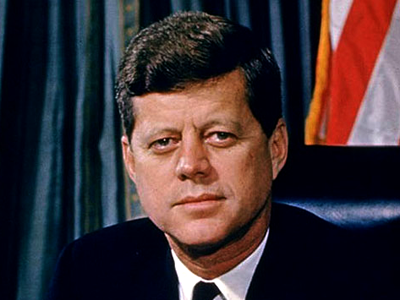
Since the young U.S. President John F. Kennedy was assassinated in Dallas on Nov. 22, 1963, there has been much speculation about the course his thousand-day presidency would have taken if this tragic event hadn’t happened. For the defenders of Camelot, the mythical court of King Arthur and the Knights of the Round Table with which the widow of Kennedy wanted to associate his presidency, the U.S. was heading for a new era of peace, prosperity and social progress. The numerous challenges that had occupied the attention of the deceased president—the fight for African-American civil rights, the confrontation with the U.S.S.R. over Cuba and Berlin, the crisis in South Vietnam, poverty in Latin America, the space race—would have been, in large part, resolved. Kennedy’s re-election in 1964 would have allowed him to consolidate his achievements and ensure his legacy.
The central element of this dominant idea, propagated by some of the most lucid minds in the immediate vicinity of the martyred president, was that he would never have sent half a million U.S. troops to underpin the corrupt and tottering anti-communist regime of South Vietnam. Kennedy’s liberal credentials were elevated sky-high in “JFK,” the controversial movie directed by Oliver Stone in 1991. This movie introduced a new generation of filmmakers to the conspiracy theories surrounding the assassination in Dallas; theories made fashionable in previous years and embraced by a growing number of Americans. For those who managed to retain an iota of objectivity when it came to the figure of Kennedy, convincing his army of adoring fans that his presidency deserved a more balanced treatment would for a long time turn out to be an almost impossible mission.
After half a century, what conclusions can we reach concerning the interrupted presidency and the direction he would have taken? Despite his personality and charisma, it is right to remember that Kennedy defeated his Republican opponent, Richard Nixon, by a margin of barely 118,574 votes in the presidential race, though the Democrat obtained more than enough support from the Electoral College—303 votes to 219. Not long after entering the White House in 1961, Kennedy’s leadership was put to a difficult test. The setback suffered by an invasion force made up of Cuban exiles in the Bay of Pigs exposed Kennedy’s inexperience, while his disastrous interview with the Soviet leader Nikita Khrushchev in Vienna two months afterward exacerbated international tensions and paved the way for the missile crisis in October 1962.
This crisis brought the world to the brink of a nuclear holocaust and was the most dangerous moment in the history of the Cold War. Khrushchev’s decision to place nuclear rockets in Cuba to discourage a U.S. invasion of the island and ensure Castro’s survival was an irresponsible and reckless gamble. Luckily, Kennedy resisted proposals by other heads of state to attack Cuba and destroy the nuclear warheads, favoring a negotiated settlement. Kennedy issued an order for a naval and air blockade of Cuba, which forced the Soviet ships to retreat and gained him and Khrushchev more time to reach an agreement. The U.S.S.R. agreed to withdraw the missiles in exchange for a promise by the U.S. not to invade Cuba. The way in which Kennedy resolved this crisis cemented his reputation as a great statesman.
The culmination of the missile crisis was the first step toward political detente between the two superpowers. In mid-1963, the U.S., the U.S.S.R. and the United Kingdom signed a treaty prohibiting atmospheric nuclear tests. Kennedy’s domestic achievements, however, were not so evident.
Certainly, Kennedy declared himself in favor of civil rights for the African-American population, but he could not persuade Congress to pass the required legislation. Kennedy was afraid of losing the support of southern Democrats, who took a dim view of any attempt to improve the lot of the African-Americans. The confrontations between the followers of Martin Luther King and defenders of racial segregation in Alabama and other southern states were a warning that things had reached a limit.
The Kennedy that arrived in Dallas seemed relaxed and sure of himself. He would have easily beaten the Republican candidate Barry Goldwater in the 1964 presidential contest. In his second term, Kennedy would have been better placed to satisfy the claims of the African-American minority. On the other hand, Kennedy would have continued to press ahead with the Alliance for Progress, his aid program to combat poverty in Latin America and neutralize the influence of the Cuban Revolution, with more vigor than his successor. Lyndon Johnson always stated that his government plan was that of Kennedy. He was largely right. The doubt that persists is whether or not Kennedy would have opted to increase the U.S. presence in the Vietnamese conflict. The experience from the Bay of Pigs and the missile crisis led Kennedy to distrust armed solutions to conflicts. Shortly before his death, Kennedy announced that he would reduce the number of U.S. military advisers posted in South Vietnam. By 1963, he was convinced that a measured response to a regional crisis was preferable to any action taken in haste.

Leave a Reply
You must be logged in to post a comment.